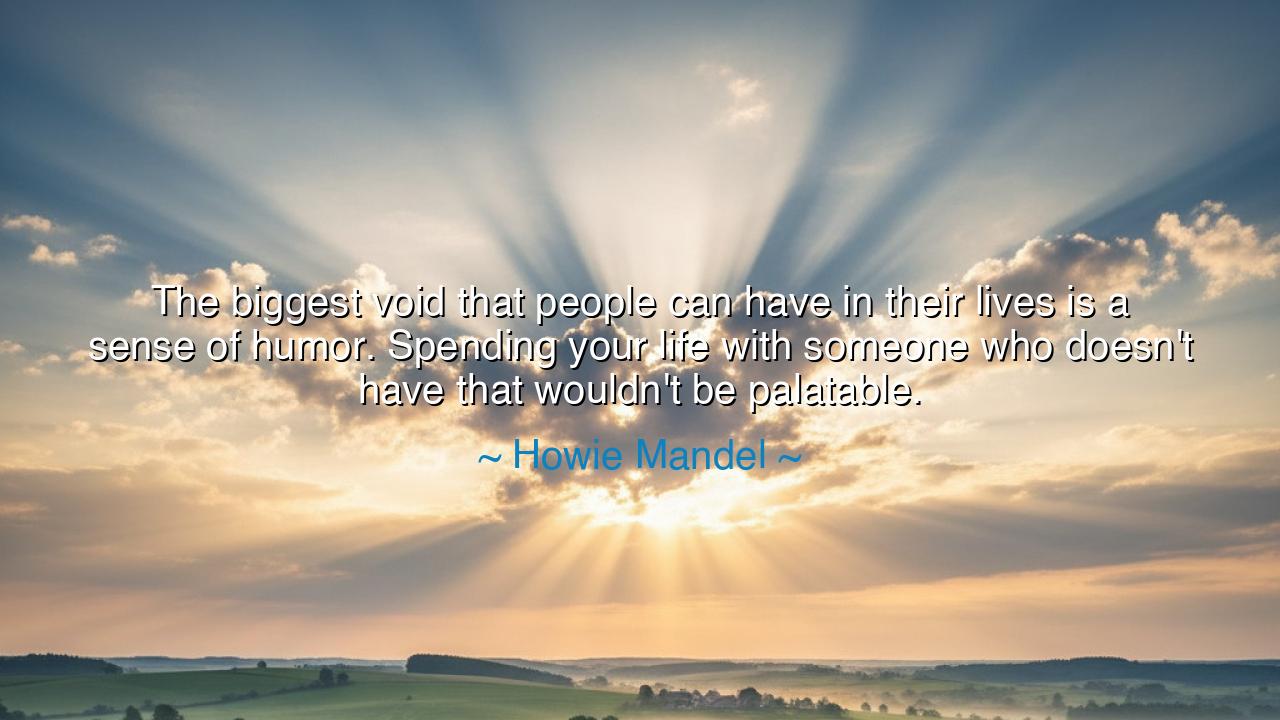
The biggest void that people can have in their lives is a sense
The biggest void that people can have in their lives is a sense of humor. Spending your life with someone who doesn't have that wouldn't be palatable.






When Howie Mandel said, “The biggest void that people can have in their lives is a sense of humor. Spending your life with someone who doesn’t have that wouldn’t be palatable,” he spoke not merely as a comedian, but as a philosopher of the heart. In those simple words lies an eternal truth: that laughter is not a trivial pleasure, but a vital force—a breath of the soul. Mandel reminds us that humor is not decoration; it is the light that reveals the world’s beauty even in its darkness. Without it, life grows heavy and hard, and the human spirit starves for warmth. To live without humor is to live without air, and to share one’s life with one who cannot laugh is to dwell among shadows where joy cannot survive.
The origin of this reflection can be traced to Mandel’s own journey through comedy and personal challenge. Known for his quick wit and boundless energy, he has also been candid about his struggles with anxiety and obsessive-compulsive disorder. Yet through all of life’s difficulties, Mandel has held fast to laughter as his anchor. He has learned, as few do, that humor is both shield and medicine—a way to endure suffering without surrendering to it. It was not mere jest when he spoke of humor as the cure for life’s void; he knew it as truth, tested and proven by his own living. For when the storms of existence rage, those who can laugh—even in sorrow—carry within them an unbreakable flame.
To say that the biggest void in life is the absence of humor is to acknowledge the sacred role of laughter in human connection. Humor is the language of understanding, the bridge between hearts. It dissolves pride, softens pain, and unites strangers in shared humanity. Two people who can laugh together can endure almost anything together; but where laughter dies, resentment grows, and love itself begins to suffocate. In the company of one without humor, every joy becomes too serious, every trial too grave. Thus, Mandel’s words are a warning as much as a wisdom: choose your companions not only for their strength or virtue, but for their laughter, for humor is the soul’s capacity to forgive the world.
The ancients understood this power well. The great philosopher Aristotle once wrote that wit is “the intelligent form of amusement,” a sign of wisdom rather than folly. Even in the courts of kings, the jester was the only one who could speak truth to power through laughter. In his jest, the tyrant saw his own reflection, and in that reflection, wisdom could dawn. The holy texts of many traditions also reveal this truth—how even prophets and sages used irony and humor to awaken their followers from spiritual slumber. For humor is divine balance: it teaches humility without humiliation, courage without bitterness, and hope without denial.
Consider the life of Abraham Lincoln, a leader burdened with the weight of a nation’s sorrow. In the midst of civil war, when death and despair surrounded him, Lincoln often turned to humor—not as escape, but as survival. He told stories and jokes that his advisers sometimes thought ill-timed, but they were the balm that kept him sane. When asked why he laughed in such dark times, he replied, “I laugh because I must not weep.” This is the same spirit Mandel speaks of: humor as the light that keeps the darkness from consuming us. Those without it are not merely somber—they are adrift in the void, without the compass of joy that keeps the human heart true.
Mandel’s words also remind us that humor is not frivolous; it is deeply moral. To laugh is to recognize life’s absurdities without losing compassion. To share laughter is to acknowledge that we are all imperfect and yet all deserving of grace. The one who cannot laugh is often the one who cannot forgive, who clings to pain and pride as though they were treasures. Humor, then, becomes the mark of freedom—it releases us from the tyranny of our own seriousness. The truly wise are those who can smile even in failure, who can see in every fall the comedy of being human.
Therefore, let this be the lesson: cultivate humor as a sacred virtue. Laugh often, and especially at yourself. Seek companions who lighten your heart, not those who burden it with solemnity. When sorrow comes, do not banish laughter; let it sit beside your grief, for the two are kin. Remember that to find humor in life’s trials is not to mock them, but to master them. Laughter is not denial—it is defiance, the soul’s quiet proclamation that it will not be crushed.
And so, heed the wisdom of Howie Mandel: “The biggest void that people can have in their lives is a sense of humor.” Fill that void, and you will find resilience where others find ruin, joy where others see despair. For laughter is not merely sound—it is the pulse of the living soul, the echo of eternity reminding us that even in the struggle of existence, there is always something beautiful, something absurd, something worth smiling about. When we laugh, we rise above the world’s weight—and in that lightness, we remember that to be human is, itself, a kind of divine comedy.






AAdministratorAdministrator
Welcome, honored guests. Please leave a comment, we will respond soon